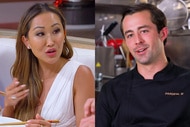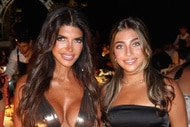
Create a free profile to get unlimited access to exclusive videos, sweepstakes, and more!
Meghan Markle Might Raise the Royal Baby on a Vegan Diet — But Is It Safe?
The Queen is reportedly "outraged" by reports that Meghan Markle wants to raise royal baby Sussex on a plant-based diet.

The latest Meghan Markle news that's ruffling everyone’s feathers (including the royals) is that she is planning to raise her baby vegan. A “palace insider” told Woman’s Day that Meghan and Prince Harry have already made the decision about their baby’s diet, and that the Queen is reportedly “outraged” at the idea.
Is it really safe to raise a vegan baby — or is the Queen's (reported) reaction spot on? The Feast turned to a few nutritionists for some answers.
Dr. Nicole Avena, author of What to Feed Your Baby and Toddler says it’s all about getting the right nutrients, and yes — that can still happen on a vegan diet.
“You can raise a healthy baby on a vegan diet, but you have to be very careful and plan meals well to ensure that the baby does not become nutrient deficient. Vegan babies can be at risk for protein, vitamin B-12, iron, and zinc deficiencies,” Avena says. “Many vegan-friendly sources of these nutrients, like nuts and seeds, aren’t baby friendly because they pose a choking hazard. And unlike adult vegans, who can easily take supplements to make up for these deficiencies, it isn’t quite so easy to supplement an infant or toddler. If you opt to give your baby a vegan diet, you also need to make sure that you don’t become overly reliant on processed foods, as these can be a source of excess salts and sugars that are not healthy for a growing baby.”
Sources of protein that can be a healthy part of your baby or toddler’s diet are quinoa, soy, grains, and beans, Dr. Avena says. “The trick with being vegan (or any eating style) is to make sure that you have a variety in it. The more variety, the more likely you are to get baby the essential nutrients that are needed for them to stay healthy and grow strong. Toddlers are notoriously picky eaters, so parents of vegans may have to work a bit harder to ensure that their baby gets variety, since major foods groups are being eliminated as options.”
Nutritionist Tara Allen is an “almost-vegan” who does eat eggs, and is a mom to two young kids. She does not recommend raising babies on a strictly vegan diet, unless you really know what you are doing.
“[Raising babies vegan is a no] for most people. The exception would be if the child’s parents or caregivers have up-to-date and advanced nutrition education. With the proper knowledge and a little supplementation (B12, in particular), a vegan diet can be very healthy and balanced,” she says. “One of the biggest concerns people have when discussing a vegan diet comes down to protein quantity and quality. Around the age of six months, when a baby is usually about ready to start eating solid foods, there are plenty of ways to ensure they are getting in enough protein. For one, babies and young children do not need nearly as much protein as adults do."
She continued, "What’s more important for their health is that they are getting in a variety of protein sources throughout the day. In addition to breastmilk (or formula), vegan protein sources include beans, legumes, nuts, nut butter (when given the green light by the pediatrician), seeds, seed butter, and whole grains. Many vegetables contain protein as well and can really add up when considering the total amount of protein needed for children. Peas, broccoli, and edamame contain more protein than most other vegetables.”
Advanced knowledge and up-to-date research comes in handy when raising a baby on non-animal sources of protein. Many are considered “incomplete” because they do not contain all the essential amino acids (protein building blocks) at once, explains Allen.
“By mixing and matching various plant-based protein sources throughout the day, we are able to provide our bodies with all of the essential amino acids,” she says. “Special considerations to be made for babies on a vegan diet would also include introducing new foods slowly to rule out allergies and providing age-appropriate food sizes and textures. Baby-led weaning — the process of allowing babies six months or older pick up pieces of food and feed themselves — has become a popular choice for introducing solids. Not only is this convenient in allowing the baby to eat what the other children and adults are eating, but this style of feeding also teaches autonomy and allows babies to feed themselves based on their own hunger and needs. Babies could be given an array of various food types and colors. A few examples of ‘baby-friendly’ vegan foods: avocado slices, steamed peas, mashed sweet potatoes, cut-up blueberries, coconut yogurt, and cooked black beans.”

























